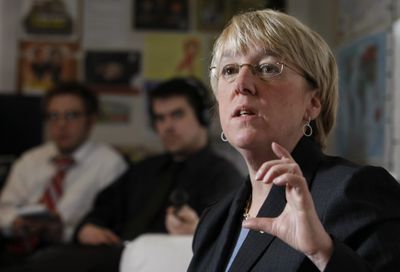Banking, housing troubles remain, Murray warns

OLYMPIA – The $787 billion economic stimulus bill to be signed today by President Barack Obama “is not the end of what we need to do,” U.S. Sen. Patty Murray said Monday.
The Washington Democrat said the package, which includes funding for transportation, education, unemployment benefits and more, was the best compromise on a controversial plan.
But more remains to be done, she said, to shore up the banking industry and deal with the rapid increase in home foreclosures.
Members of Congress have been warned that Obama’s budget proposal, to be released soon, will be a tough budget “in terms of cutbacks,” she said.
Murray was in Olympia on Monday meeting with state legislative leaders, including Senate Majority Leader Lisa Brown, D-Spokane, and House Speaker Frank Chopp, D-Seattle.
The plan will help state budget writers somewhat. It includes $2 billion in new money for Medicaid, $2 billion for cleanup work at the Hanford Nuclear Reservation, and $812 million in state stabilization money, most of it for education.
“That was a significant debate,” Murray said of the stabilization money. Key lawmakers, she said, were concerned about accountability over how that state money would be spent.
And with the state wrestling with a budget shortfall estimated to be at least $6 billion, Murray said state lawmakers still have tough choices to make.
Lawmakers were clearly hoping for more state dollars, she said, but are grateful for the federal help nonetheless.
Some $500 million in new cash for the state’s roads and bridges will be largely up to the state Department of Transportation and local transportation authorities to divide, she said.
But Murray urged patience, saying the money will take time to work its way into the economy.
“I think my worst fear is people are going to think things are better next Friday,” she said.
Some economists, she cautioned, say that the stimulus might not start turning around the economy until the end of the year.
“But the alternative of doing nothing,” she said, would create “an impact almost immediately.”